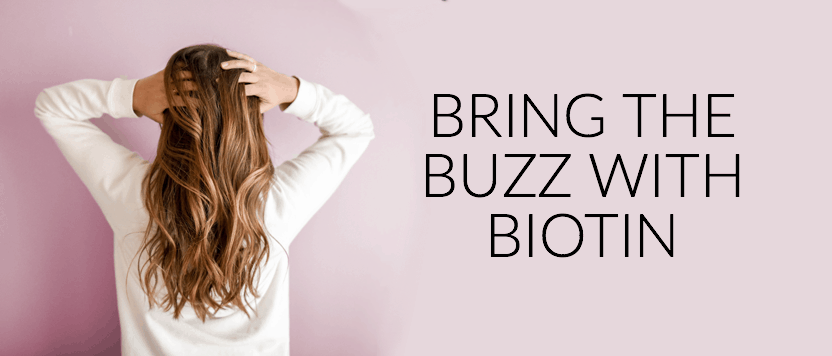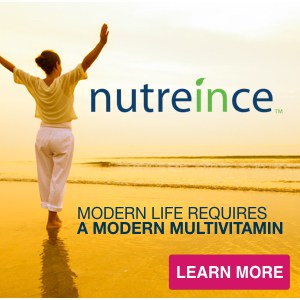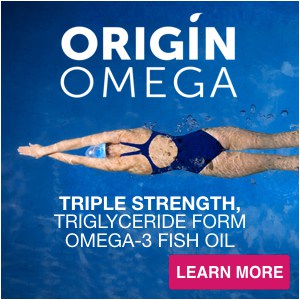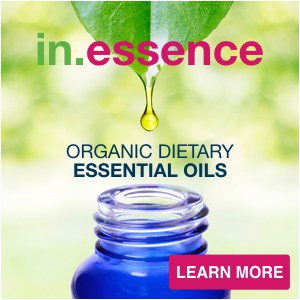Need thicker, stronger nails and shiny, lustrous hair? Look no further than biotin! . . . or at least that’s what many beauty product and supplement headlines would have you believe! As usual, we are here to help you understand what the science says: yes, sufficient biotin supports normal hair and nail growth. If you are deficient in biotin, take action. BUT, there is no evidence to support that mega-doses of biotin, which we routinely see in supplements, will overcome other problems or nutrient deficiencies that may be contributing to hair and nail problems. Are you minding your minerals? B vitamins other than just biotin? Protein levels? Maybe a multi-faceted approach is in order.
That doesn’t mean biotin isn’t important for you to know about. Biotin helps you get energy from your food, build fats, and deal with stress. Biochemically, biotin acts as a cofactor (a helper) for 4 important enzymes in humans called carboxylases. A carboxylase helps stick a carbon dioxide to another molecule. Think of how common doing that must be in our carbon-and-oxygen-rich biochemical world. Now that you are beginning to understand the importance of biotin, and you understand the fact that biotin cannot perform unmitigated metabolic miracles, let’s focus on what biotin can do. Read on to learn more about the discovery of vitamin B7, why it is such a critical nutrient for your health, how you can boost your biotin with each bite, downplay depletion, and supplement safely.
What is Biotin?
Biotin was actually discovered several times by different people in the 1920s who were investigating growth factors in yeast, but it wasn’t established as a vitamin for almost 40 years!
In 1927, the biochemist M. A. Boas noticed a pattern: rats fed a diet high in raw egg whites would develop skin rashes, lose their fur, and ultimately become paralyzed. The condition became known as “egg white injury,” resolved by a factor referred to early on as “vitamin H” or “protective factor X” and ultimately named “biotin.” But why raw egg whites only? Why not cooked eggs? Or the egg yolk? Turns out, the egg yolk is full of biotin. However, raw egg white contains a protein called avidin which binds biotin and makes it unavailable to your digestive tract. Cooking egg white thoroughly will denature the avidin so it is no longer a potent biotin depleter!
Most Americans consume sufficient biotin in their diets, but as you may have learned from our educational content and books by now- just eating enough of a specific micronutrient does not guarantee sufficiency! Biotin is a water-soluble vitamin and must be supplied daily in your diet because your body does not store substantial amounts. As such, some may choose to supplement with the RDI (recommended dietary intake) to avoid potential deficiency, which is 30 mcg. You will find most supplemental vitamin B7 in the form d-biotin, which is also made by some bacteria. Also, biotin needs magnesium around to function properly. While there is no established toxic level of supplemental biotin intake, we will explain later why you may want to rethink megadosing with this particular B vitamin. Some may supplement because they follow diets that have been shown to be low in biotin-rich foods- such as paleo, primal, and other gluten-free diets![1]
B7 : Bringing the Buzz and Brimming with Benefits
Biotin is a fantastic helper, supporting critical carboxylases (enzymes) you use in every cell to burn food for energy, build fats, and break down amino acids (process parts of protein).
- Brings the Buzz. Biotin assists in metabolizing both fat and sugar in ways that are important for building the body and others that help you get or store energy from all three macronutrients- carbohydrate, fat, and protein. Biotin helps you make fatty acid chains for energy storage, break down protein pieces (amino acids), and process those pieces into sugar to burn (gluconeogenesis). Biotin also helps you convert sugar into energy you can use in your cellular engines (mitochondria).
- Cholesterol Creation. Biotin supports the work of coenzyme A, a vitamin B5 derivative. Coenzyme A supports a critical enzyme used to make essential fatty acids and cholesterol. Products include stress and sex hormones, the sleep hormone melatonin, and the neurotransmitter acetylcholine. Also, cholesterol is required for healthy cell membranes.
- Nourishes Nerves. Biotin keeps your heart beating because it helps maintain a steady energy supply to nerve cells. As noted above, biotin also supports your cells’ ability to use that food supply.
- Protein Processing. Biotin helps you break down certain amino acids into their component parts.
- Supports your Stress Response. Your adrenal glands, walnut-sized glands sitting atop your kidneys which make the stress hormones cortisol and adrenaline, require vitamins B1 and B5 to function properly.[2] Vitamin B5 supports healthy cortisol levels and adrenal gland function.[3] Vitamin B7, as noted previously, supports the cholesterol-and-fatty-acid-building functions of vitamin B5 as coenzyme A.
- Healthy Hair and Nails. Because biotin deficiency may cause skin rashes, hair loss, and brittle nails, many turn to biotin supplements to support lustrous hair and strong nails. However, evidence is weak that, beyond solving a deficiency, additional biotin will cause this desired effect. There is more evidence that improving protein and mineral intake will result in stronger, healthier nails than biotin supplementation. We couldn’t agree more that covering your bases (consider our POWER Organic Whey & Plant Proteins for great ease) with regular, high quality protein should be foundational in any diet, especially one that supports beauty!
- Supports Glowing Skin . As mentioned above, biotin deficiency, or “egg white injury,” results in skin rashes. Because vitamin B7 supports vitamin B5 in its role of forming fats that support supple skin, biotin can’t be ignored on your glowing skin checklist! B-e sufficient!
As you can see, vitamin B7 is critical for your metabolic health. For those who are deficient, note its many roles above: biotin has also been shown to help prevent and support the treatment of acne, anxiety, arthritis, chronic fatigue, depression, dermatitis/eczema, type 1 diabetes, type 2 diabetes, impaired immunity, inflammation, muscle aches and pains, seizure disorders such as epilepsy, and thyroid problems.
Vitamin B7 Deficiency May Increase Disease Risk
Symptoms of Vitamin B7 depletion include:[4],[5]
- Loss of hair and hair color
- Hallucinations
- Depression
- Lethargy
- Scaly dermatitis, especially around the nose, mouth, eyes, and genital area
- Lesions on the nose and mouth
- Anorexia (loss of appetite)
- Nausea
- Numbness and tingling of the extremities
- Poor muscle tone
- Muscle pain
- Cardiac irregularities
- Seizures
- Impaired use of glucose (blood sugar instability)
Biotin deficiency is extremely rare, thankfully,[6] and many of its deficiency symptoms look similar to vitamin B5 deficiency due to their synergy.
Let’s focus for a moment on three common conditions that may be affected by biotin deficiency:
- It takes a village of nutrients, including a host of B vitamins, to support healthy bones. Biotin deficiency has been shown to negatively affect the status of insulin-like growth factor 1 (IGF-1),[7] which supports bone formation. Biotin also plays a role in making bone marrow.
- Diabetes. Biotin helps support normal glucose (blood sugar) metabolism both directly and indirectly. Biotin both supports your ability to burn carbohydrate and helps you convert protein into sugar when glucose is low (gluconeogenesis).
- Fatigue. Many B vitamins, biotin included, play critical roles in energy production. Also of note is magnesium’s role as a cofactor for biotin- make sure you are sufficient in both nutrients to cover your bases!
Who is likely to be deficient in vitamin B7?
While consuming refined grains has historically been associated with biotin deficiency, we now fortify refined grains with vitamin B7 to avoid this issue (though we haven’t completely solved the problem of refined grains having reduced levels of several micronutrients). Currently, those who may be deficient include:[8],[9]
- Alcoholics
- People on Paleo, Primal or gluten-free diets
- People with biotinidase deficiency (important enzyme for releasing free biotin)
- Pregnant and breastfeeding women
Even if you are not on this list, and especially if you are, let’s break down how to boost your B7 from foods, lifestyle choices, and supplementation.
Be in Balance with Biotin
STEP ONE – FOOD: Choose both animal and plant foods rich in vitamin B7.
- Choose foods rich in vitamin B7. Due to its role in energy production, all plant and animal foods contain at least very low levels of biotin. Animal foods rich in B7 include liver, eggs yolks, pork, salmon, tuna, brewer’s yeast, and to a lesser extent milk and cheese. Plant foods rich in vitamin B7 include peanuts, sunflower seeds, almonds, sweet potato, avocado, swiss chard, and cauliflower.
- Avoid Antinutrients. Avoid eating a lot of raw egg whites, which contain the protein avidin that binds biotin and hinders its absorption. If you are biotin-deficient, you may choose to avoid egg whites altogether, or at least cook your eggs well to denature and reduce the activity of avidin. Sprouting and soaking your grains, nuts, and seeds can reduce the anti-nutritive effect of lectins, found in all plant foods to some extent. The worst offenders are rice, wheat, spelt, rye, barley, soy products and other legumes, seeds, nuts, corn, potatoes, tomatoes, eggplant, hot peppers, and bell peppers.[10]
- Can the Cans. Biotin is particularly sensitive to canning techniques.[11] Choose fresh or frozen foods to preserve biotin content.
- Give thought to Gluten-free (including Primal and Paleo diets). At this time, enriched grains in processed food products are an important source of biotin in the US diet. Many people rely on fortified foods formed from flour as an important biotin source. If you consume a gluten-free diet, you may choose to cover your bases by eating more grain-free foods high in biotin (see above), or consider supplementation for greater peace of mind.
- Avoid Excessive Alcohol. Alcohol decreases your absorption of all vitamins, minerals, and essential fatty acids. Excessive alcohol can damage your gut lining, further reducing your ability to absorb B vitamins. Limit beer, wine, and hard alcohol to two drinks per day to reduce nutrient depletion, if you choose to indulge.
STEP TWO – LIFESTYLE: Consider your digestion, medications, and overall health to support your vitamin B7 status.
- Mind your Medications. Many medications can deplete biotin levels, including:
- Anticonvulsant barbiturates such as carbamazepine (Carbatrol, Epitol, Equetro, Tegretol), primidone (Mysoline), and phenytoin (Di-Phen, Dilantin, Phenytek)
- Sulfonamides, sulphonamides, or sulfa drugs such as sulfadiazine, sulfamethizole (Thiosulfil Forte), sulfamethoxazole (Gantanol), sulfasalazine (Azulfidine), and sulfisoxazole (Gantrisin)
- Macrolide antibiotics such as amoxicillin (Amoxil, Trimox), erythromycin (Robimycin), azithromycin (Zithromax), and clarithromycin (Biaxin)
- Fluoroquinolone antibiotics such as ciprofloxacin (Cipro), enoxacin (Penetrex), gatifloxacin (Tequin), levofloxacin (Levaquin), lomefloxacin (Maxaquin), moxifloxacin (Avelox), norfloxacin (Noroxin), ofloxacin (Floxin), sparfloxacin (Zagam), and trovafloxacin (Trovan).
- Soothe Stress. Make time for yourself to rest, digest, and relax. Excessive stress puts you in dis-stress and depletes vitamin A, all of the B vitamins including biotin, vitamins C, D, and E, calcium, chromium, copper, iodine, iron, magnesium, potassium, selenium, zinc, omega-3 fatty acids, and certain amino acids.[12] Whew! It’s stressful just reading that. Maybe it’s time to chill out with a triple threat shake and a warm bath.
- Munch Mindfully. Giving your body time to eat makes a huge difference in the production of digestive juices (acid, enzymes, and bile) that can do the hard work of digesting food and supporting your intake of this and other vitamins, particularly B vitamins. “Rest and digest” is a nutrient-nurturing way of life. Take your time.
STEP THREE – SUPPLEMENTATION: Be right on target with your Bs.
- Avoid excessive supplementation of vitamin B7 (and other B vitamins). Although B vitamins are water-soluble and excess are removed in your daily urine, most supplemental B vitamins are served up in a cocktail- such as in a B complex or multivitamin. As multivitamin producers and the creators of anti-competition technology, we are mindful of making the best possible product to support your health. For instance, vitamin B12 deficiency can compromise your ability to utilize biotin.[13] Although they work together metabolically once they are absorbed, vitamins B7 and B5 (pantothenic acid) share a common carriermediated uptake system and therefore compete for absorption. We consider it unwise to block the benefits of both vitamin B5 and B7 by taking them at the same time – that is why they are seperated into our AM and PM doses in nuteince. High concentrations of alpha lipoic acid, a master antioxidant, can also compete with biotin for absorption.
- Seek Synergy. Another reason to seek out the sweet spot for supplementation with B-complex vitamins or a multivitamin containing vitamin B7 is to promote micronutrient synergies. For instance, vitamin B7 and B5 work together in many metabolic situations despite their competition for absorption.
- Roll with the Recommended Daily Intake (RDI). The adult RDI for vitamin B7 is 30 micrograms, the amount we provide in nutreince as the active form d-biotin. Because we can obtain vitamin B7 from a healthy diet and gastrointestinal tract, the RDI is a good insurance policy and more should not be necessary to obtain micronutrient sufficiency! While there is no set upper intake level for biotin, we recommend sticking with the RDI for supplementation to avoid compromising your vitamin B5 status (see above). We don’t suggest creating new problems by over-supplementing.
In short, biotin (vitamin B7) is a potent bringer of the buzz, friend to your fat metabolism, skin smoother and nerve nourisher. We highly recommend you don’t forget this essential nutrient when considering your micronutrient sufficiency! Like all B vitamins, biotin is required, everyday, as a critical part of your diet, and we recommend you supplement smartly if you are on a diet that restricts it or need an insurance policy to cover yo
[2] https://www.ncbi.nlm.nih.gov/pubmed/19958055
[3] https://link.springer.com/article/10.1007/s00217-016-2772-3
[4] https://ods.od.nih.gov/factsheets/Biotin-HealthProfessional/
[5] Micronutrient Miracle
[6] Combs GF, Jr. Biotin. In: Combs GF, Jr., ed. The vitamins: fundamental aspects in nutrition and health. Third ed. Burlington, MA: Elsevier Academic Press; 2008:331-44.
[7] https://link.springer.com/article/10.1007/s00394-009-0773-8
[8] https://ods.od.nih.gov/factsheets/Biotin-HealthProfessional/
[11] https://ods.od.nih.gov/factsheets/Biotin-HealthProfessional/
[13] Naked Calories











